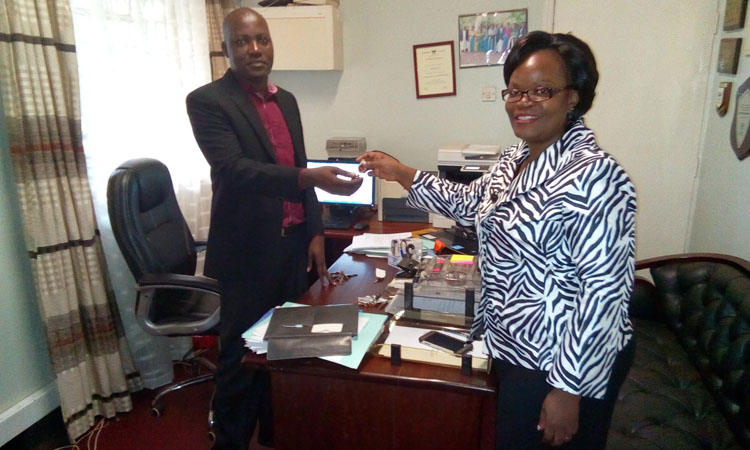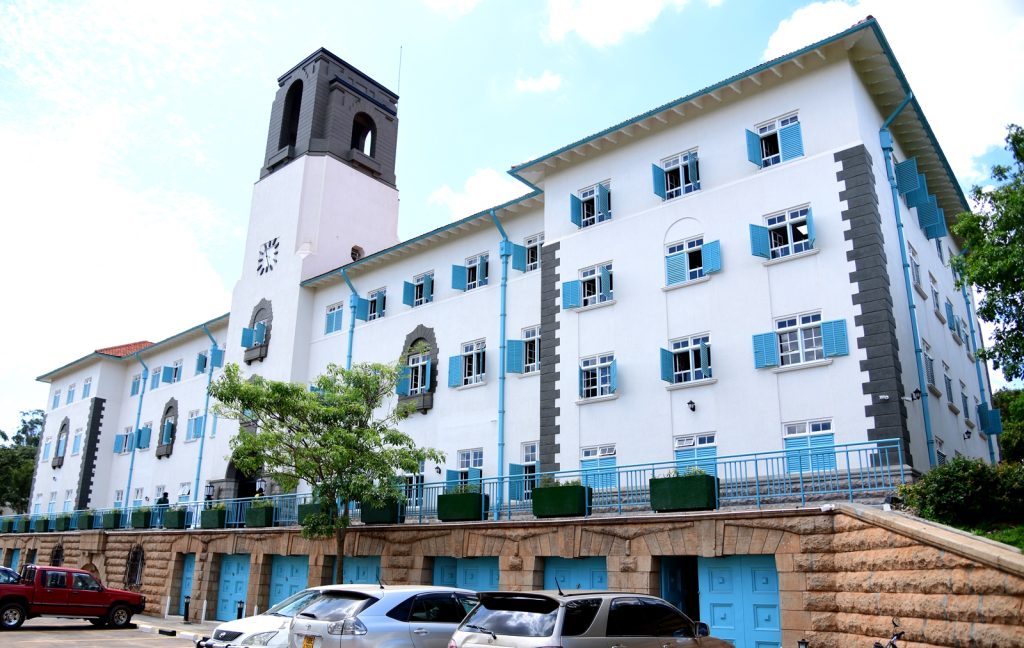SoL Ag. Principal Hands Over Office
Dr. Damalie Naggita Musoke who has been acting Principal in the School of Law since February 2013 has handed over officeto Dr. Christopher Mbazira with a call on all staff to give support to the incoming Ag. Principal.
She commended all the staff for the cooperation and team work exhibited that enabled her to run the office and an opportunity to be the first in the position of Principal following the elevation of the School of Law to College status.
In her hand over report, shehighlighted some of the achievements and challenges she experienced in her tenure specifically pointing out areas that need urgent attention by the incoming office bearer.

She made mention of the elevation of the School to College status, and the plans to transform the Refugee Law Project (RLP) and the Gender, Law and Sexuality project into Centers as well as making the Public Interest Law Clinic (PILAC) a Directorate.
Dr. Damalie Naggita Musoke said she leaves behind active committees through which school business is executed namely;The School Academic Board, Examiners’ Board, Examinations Irregularities and Appeals Committee, Research and Graduate Training Committee,Establishment and Appointments Committee, Administrative Board, also doubling as the School Finance Committee, Contracts Committee, as well as the Anti –Sexual Harassment Committee.
In the area of academics, she pointed out that the School of Law continues to strive towards attaining the set outcomes of the law program in accordance with the Mission and Visionwhich is producing law graduates who are able to carry out legal research and give advice on applicable legal principles to Government departments, the private sector and individuals.
Furthermore, she indicated that the intention is to have products that are academically prepared to undertake practical legal training in preparation for legal practice, and graduates conversant with the principles relating to the rule of law and protection of individual and society rights and freedoms as well as career persons who are adaptable to the work environment, able to debate and articulate legal issues and contribute to law reform.
She said the three programs that include the Bachelor of Laws, Master of Laws as well as the LL.D continue to run as expected and that apart from the usual Master of Laws program, the School of Law in Partnership with the University of Pretoria conducts a Master’s degree in Human Rights and Democratization in Africa, co administered with thirteen other African Universities. She said recently, the School of Law concluded an MOU to undertake a joint PhD in Human rights together with the Centre for Human Rights, University of Pretoria, The University of Nairobi and Abo Akademi University of Finland. The initial LLD/Phd Candidates from Makerere on the programme are Mr. Benson Tusasirwe and Ms. Patricia Atim, both lecturers in the law school, she added.
The outgoing Ag. Principal said that the School of law undertook a curriculum review exercise in order to remain relevant amidst the ever changing operational environment locally, regionally and internationally. The existing programs were reviewed and proposals made to take on other programs such as Master of Laws (LLM) Plan B, Specialized LLM Degree programs namely, LLM Commercial Law, LLM Human Rights, LLM Environmental Law, LLM International Law and LLM in Petroleum and Energy Law.

She however noted the inadequate number of teaching staff with only of42 teachingstaff, with a number of staff that have left service for varied reasons but not replaced. This, she said is a constraint and condemns the available staff to operate heavy teaching and supervision loads at the expense of other core activities like research and publication, knowledge transfer and community outreach.
In the area of Research, she said effort has been made to strengthen collaborations and networks by management and individual members of staff. Such include studies by the Human Rights and Peace centre which serves as a research hub in the area of Human Rights both at local and international levels. Other research efforts have been through the Religion, Rights and Peace Fellowship, as well as the Public Interest Law Clinic (PILAC which has done a fair share of research in areas of disability, Peace and Governance and human rights and social justice generally. In this way, she said, the School of Law has made effort in restoring the lost glory of the academia being at the centre stage of holding intellectual discourses on issues of importance as well as emerging issues both nationally and regionally and globally.
The Ag. Principal said the School of Lawthrough the Environmental Law Centre is now a regional training hub in water law and policy. The Centre conducts short courses in Water Law and Policy, having been named Centre of Excellence in Water Law and Policy by IGAD.
She pointed out other collaborations by the school of Law that include the DLAPAPER Global Scholarship andNuremberg Universitythat have interest in funding students and provideinternship opportunities. Other collaborations are with the School of Law and Abbo Academi, School of Law and Aarus University, The Institute of Development Studies (IDS), School of Law and Urgent Action Fund-Africa (UAF-Africa), Xiantang University, Pretoria University among others.

In an effort to realize the University’s objective of being responsive to the needs of the Community, Dr. Naggita said the school of Law has increased engagements with communities through programs like the Refugee Law Project, that targets Refugees and Internally displaced persons, The Religion, Rights and Peace Fellowship, that reaches out to other Universities and Communities as well as The Community Law Program and Mobile Clinic which has a legal aid Unit that offers free legal aid services to the communities surrounding the University in addition to Internship that has not only benefited the students through learning but also the host organizations through the services offered by the students.
She highlighted some of the challenges that face the School of Law that include
being financially dependence on Tuition fees transfers for its activities which is inadequate, issues of space and infrastructural , non-Payment for teaching and working on the privately sponsored programs among others.



